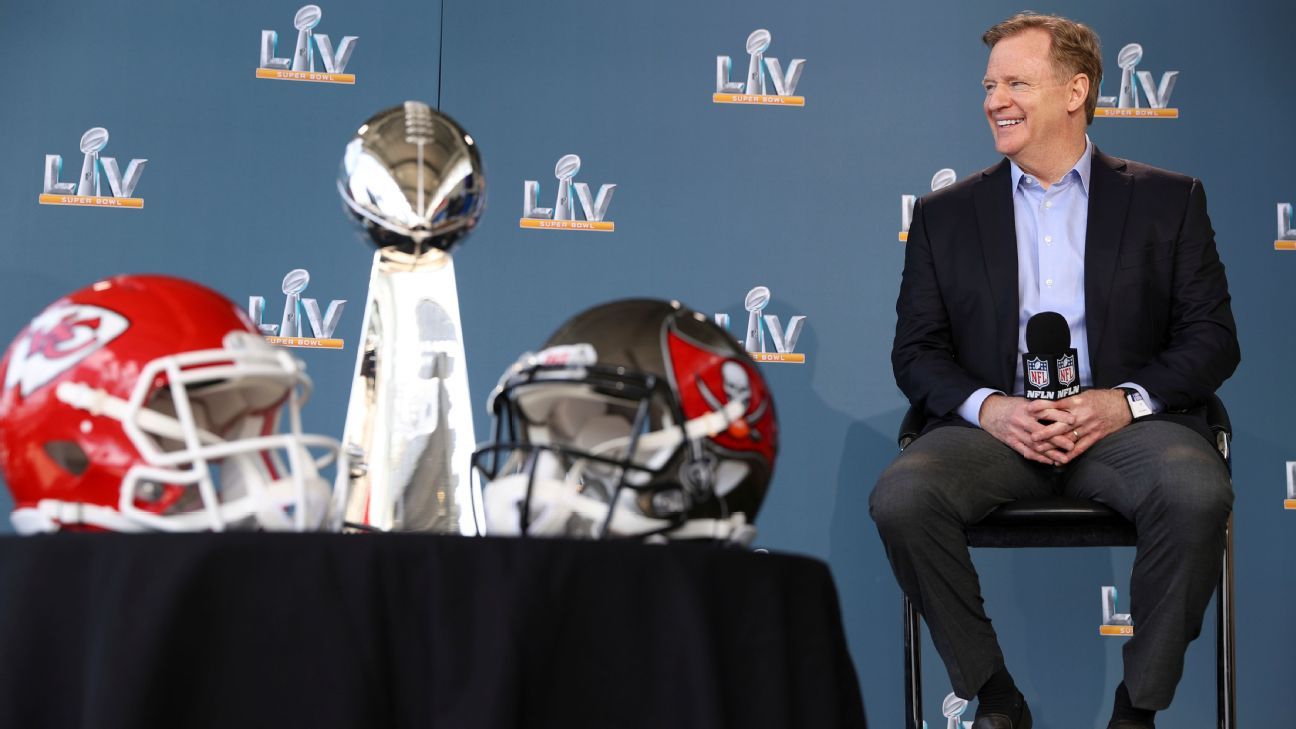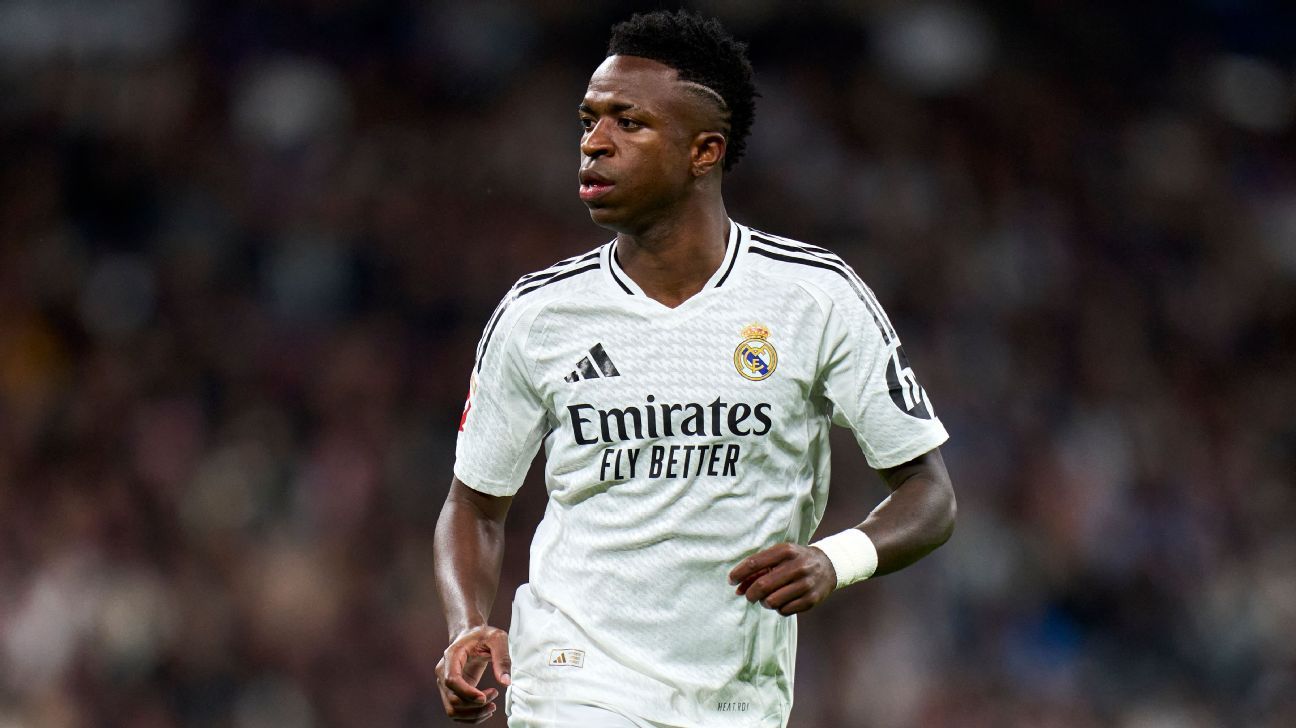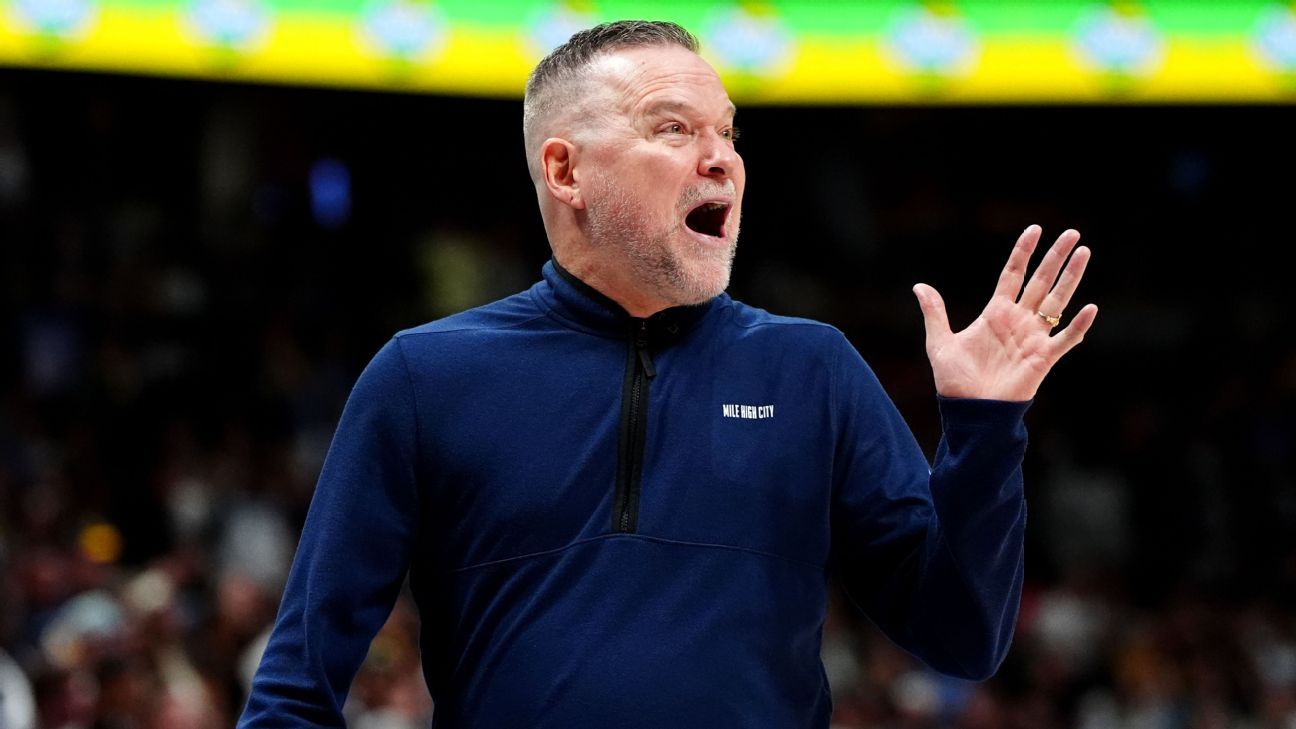
TAMPA, Fla. -- NFL commissioner Roger Goodell expressed disappointment Thursday that only two minorities were hired for seven head-coaching openings despite a growing pool of qualified candidates.
"I'm not sure there's an issue we spent more time with our ownership on," Goodell said as part of his annual state-of-the-league address ahead of Sunday's Super Bowl. "Our ownership is committed and focused on this."
The commissioner emphasized that lack of diversity isn't just a head-coaching issue but an issue throughout positions on all clubs.
"It's much broader than just head coaches for us," he said. "But head coaches is important. And we put a lot of our policies and focus on that this year. As you know, we had two minority coaches hired this year. But it wasn't what we expected, and it's not what we expect going forward."
The two head coaches he referenced are the New York Jets' Robert Saleh, who is of Lebanese descent, and the Houston Texans' David Culley, who is Black. They joined Pittsburgh's Mike Tomlin, Miami's Brian Flores and Washington's Ron Rivera as the league's only minority head coaches.
That's in stark contrast to the league's player base, which is about 70% minority.
Goodell said he has had and will continue to have discussions with candidates -- the successful and the unsuccessful -- and teams over what went right and wrong in interviews in order to come up with better solutions.
"They're not the outcomes we wanted, and we're committed more than ever to make sure we do that. But we want it to be a natural process," Goodell said.
Kansas City Chiefs offensive coordinator Eric Bieniemy again did not receive a job offer, nor did Tampa Bay Buccaneers defensive coordinator Todd Bowles. Tampa Bay offensive coordinator Byron Leftwich didn't even receive an interview, despite his work with Tom Brady this season, assimilating the veteran quarterback into Bruce Arians' offense with no offseason and reaching the Super Bowl.
"It does frustrate players," linebacker Wesley Woodyard said during the NFLPA news conference. "We see ourselves as potential leaders within the NFL community. We aspire to be head coaches. We want to be GMs. But if you have guys like Eric Bieniemy, who's been an NFL legend, who's done great things within his offense, with the team that he's on, going to back-to-back Super Bowls -- that frustrates us as players."
"There has to be a platform to where we can hold each other accountable, to where the conversation continues to keeps rolling, to where these GMs, these owners have no choice but to say, 'Hey, we have to seriously check ourselves because this is an issue that has been going on. We put this rule in 17 years ago, and there has not been any kind of change."
Bucs coach Arians argued this week that teams should wait until after the Super Bowl to make coaching hires because coaches on playoff teams are essentially penalized.
But Goodell believes that the ability to do interviews virtually helped candidates, including Bieniemy, by allowing them to interview during the postseason without disruption to their game preparations.
"I think what we have really talked an awful lot about is slowing the process down and making sure teams have the opportunity to look at a diverse slate of candidates to really understand some of those candidates and the qualities that they bring, that they may not have been exposed to, for some reason or another," Goodell said, adding that they will look to see if there are some additional changes they can make.
"I know people want to focus on the head coach, but there were a lot of positives -- three new general managers that are African American," Goodell said, pointing to the hiring of Martin Mayhew with the Washington Football Team, Terry Fontenot with the Atlanta Falcons and Brad Holmes with the Detroit Lions.
"There's a lot more diversity in the coordinator position also, and across the league," Goodell said. "But we're not satisfied. And we feel like we can do better, and we're going to."
Goodell also addressed how the league handled the coronavirus this season.
He noted that there were times when there were doubts as to whether the league would be able to get a handle on the virus. Some 24 members of the Tennessee Titans organization, including 13 players, tested positive over a 2½-week period and forced the closure of team facilities.
The Week 12 matchup between Pittsburgh and Baltimore was also postponed three times due to 22 Ravens players being placed on the reserve/COVID-19 list. The game ultimately was played on a Wednesday.
"We were down to the final days in that Pittsburgh-Baltimore game. Had that not cleared on that Monday afternoon, that Tuesday morning, we probably would not have been able to play that Wednesday game," Goodell said.
Although Goodell is not certain what's in store this upcoming year, he believes "virtual is going to be part of our life for the long term," particularly in the offseason, pointing to teams being able to successfully install new offenses via videoconference, without needing to be together in one place, which is something players have supported.
"It was smarter," said NFL Players Association executive director DeMaurice Smith, who joined Goodell on stage in a show of unity. "The fact that you just didn't have guys holed up in a facility for hours on end and just killing time, the fact that we are actually able to do things via teleconference and Skype and Zoom, it's all about being smarter."
NFLPA president JC Tretter, who joined the union's news conference virtually, added that players felt mentally and physically sharper at the end of the season as a result of less time at facilities.
"We've had this false reality that that's necessary -- a ton of reps are necessary -- as we watch our bodies break down by the end of the year every year," Tretter said.
The NFL will continue to test players and staff members during the offseason, as it's not clear when vaccines will be available for them. Reaffirming his stance from December, Goodell said that the NFL would not jump to the front of the line for vaccinations, which Smith echoed.
"I wish I knew the answer to that," Goodell said. "One of the things that I have learned and all of us have learned is not to project too much in advance. ... I don't know when normal is going to be, and I don't know if normal will ever exist again. I know that we have learned to operate in a very difficult environment and have solutions, and we sure can do it again."
Smith expressed skepticism that all players and coaches could be vaccinated by September, but he pointed to the effectiveness of mask wearing, testing and contact tracing as solutions until that day arrives.
"The reality is -- just the math, there's 253 million adults in the country. The country needs to reach 75, 85% of those people to be vaccinated in order for us to reach herd immunity," Smith said. "To think that we're going to be at a vaccine-neutral state in September is probably not the case.
"What we've done has worked incredibly well. And it has not been perfect by any stretch. But I think that the way that we have crafted the protocols, we've enforced the protocols -- some teams and some coaches are a little bit lighter in the pocketbook because of it -- but I think if we can wrap our hands around the things that have worked and employ them again this season, I don't have any doubts about our season."















 Phone: (800) 737. 6040
Phone: (800) 737. 6040 Fax: (800) 825 5558
Fax: (800) 825 5558 Website:
Website:  Email:
Email: 






